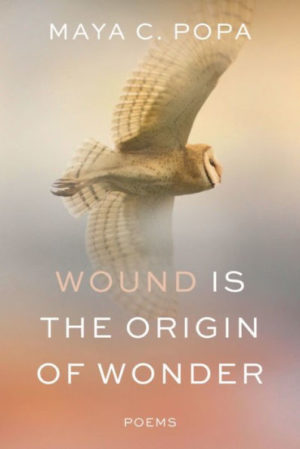Wound is the Origin of Wonder
by Maya C. Popa
reviewed by Celeste Chen
The poems of Maya C. Popa’s second collection, Wound is the Origin of Wonder, aim not to make sense of the shifting world but rather to explore what it means to exist amid its flux. Organized into three enumerated sections, Wound is the Origin of Wonder traces the course of the titular emotion—wonder—as it sweeps through the individual, spills across seasons, and inhabits the myths and stories that frame our lives.
In the collection’s opening poem, “Dear Life,” the speaker declares, in a stirring moment of catch-and-release, “I can’t undo all I have done to myself / what I have let an appetite for love do to me.” The speaker, like her appetite for love, acts and is acted upon. The poem goes on:
Often, I received more than I’d asked,
Which is how this works—you fish in open water
ready to be wounded on what you reel in.Throwing it back was a nightmare.
Throwing it back and seeing my own faceas it disappeared into the dark water.
Catching my tongue suddenly on metal
spitting the hook into my open palm.
In the first section of the collection’s triptych, Popa’s speaker ruminates on intimate, human wounds—feelings of desolation, isolation, and alienation—and inspects them in search of something contradictory: wonder. The image of an autopsy in “The Bends”—“imagine him who saw the heart froth, / the heart bubble over like soda water”—is knitted together with sentiments that lack the finality that death implies:
Then think of grief leaving the body,
flitting like salt to the nearby sink,and joy like atoms joining in air
towards another living promise.
In the next section, the scope of the speaker’s meditations widens as her observations grow in their complexity and contradiction. Time enters as both an active force that can be seen (“the hour losing / its precious light”) and a medium through which one travels (“Out there, the beloved / is slipping through time”).
In the collection’s last section, Popa’s speaker confronts the task of living in a turbulent, fraying world. The poem “Milton Visits Galileo in Florence” offers counsel: “Begin again in darkness, life says sometimes.” In “Signal,” loss is revealed to be reconstituting: “Of course, the secret aim / of losing you those months / had been to find you again.” In a nod to our pandemic experiences, the speaker in “Pestilence” observes the signs of life around her: “Someone had planted purple tulips, had imagined / the future, and here it was, arterial at dusk. // New flowers, new version of familiar long hours.”
Exemplifying the collection’s three-part study of wonder, the three poems that share the collection’s title—one allocated to each section—evolve from individual to collective considerations. In the title poem’s first appearance, the sight of a “bee that worshiped the mouths of those flowers” inspires the speaker to reflect upon her own limitations and those of the words available to her:
What would you do with the knowledge
that I’d grieve for a bee? Someone like me
could be played by the threat of endings.
I’ll lose you one day, have lost you always,
a long ongoing Westwardness of thought.
It’s not metaphor that bees make honey
of themselves while language only dreams
the hunted thing. [ … ]
When the title poem appears a second time, the speaker faces the parameters of her own existence: she is “stuck in an almost life, / in an almost time.” Time takes on the characteristic of an engine, without which the speaker and the world would be at rest:
Who would not, given acreage
in another’s mind, lie there
for a while to watch the sky be sky.
Even if we are, as the song goes, born to die, the title poem’s third and final iteration suggests that amidst destruction and death, wonder—like life—will continue to persist:
[ … ] What doom
to be beheld: you singwhen you should tremble. Will you leave me
my wondering; will it be as when
snow falls heavy on trees,and thou art felled?
Wound is the Origin of Wonder showcases Popa’s ability to weave together rich internal reflections with finely wrought observations of the natural world. True to its title, Popa’s collection traces the titular emotion all the way back to its origins, shedding light on the wound so that we may look with wonder on the fuller picture that emerges.
Published on January 17, 2023

